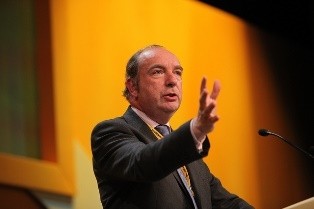10 key issues for pubs in 2014

1. Cracking the statutory code
If anyone in the trade has been holding their breath over the proposed statutory code, they’ll have turned a very funny colour since the third week of January when business secretary Vince Cable said he would announce his decision “soon”. Clearly, soon is a long time in politics. Cable is in a ‘something must be done’ mood, though, and legislation to regulate the relationship between the pubcos and their tenants seems inevitable. The question is: will it include a mandatory free-of-tie option?
And how will the demand that tied tenants are no worse off than free-of-tie be executed? There’s also the matter of an independent adjudicator and who pays for it. No doubt the lobbying — on both sides of the argument — will continue until the final whistle, and there’s still plenty to play for.
2. It’s all kicking off
Sport has increasingly played its part in delivering pubs opportunities to attract people though the doors, and this year should be no exception.
The highlight, of course, will be the football World Cup in Brazil, and the Prime Minister himself has given the nod for extended licensing hours. Then it will be down to the England team to keep the excitement going for as long as possible (that could be the tricky bit).
While the World Cup will be screened on terrestrial TV, licensees who take their football coverage seriously face the dilemma of paying for a Sky subscription or risking legal action by taking a chance on a cheaper foreign satellite channel. The Premier League has begun a crackdown on what it sees as breaches of copyright, and that could prove a problem for many community pubs.
3. The Blackpool effect
Blackpool Council’s rejection of an early-morning restriction order (EMRO) that would have forced the town’s bars to close at 3am could prove a turning point in strategies to manage alcohol-related disorder. So far, no local authority has deployed an EMRO, though the late-night levy option has tempted a number of cash-strapped councils to get pubs and bars to make a compulsory contribution towards managing the problem.
Blackpool is also one of 20 towns and cities named as a local alcohol action area, a new initiative that aims to bring together various agencies in a partnership approach. It’s been generally welcomed by the industry as a positive alternative to more coercive and restrictive measures.
4. Punch drunk
The process of Punch Taverns’ debt restructure took yet more twists after Punch withdrew its proposals two days before the company’s stakeholders were due to vote on them. Separately, a group representing senior Punch bondholders urged creditors to support its alternative restructure proposals, which it says are “well advanced among creditor groups”.
The company will now try to get agreement on new proposals prior to 15 April or face possible administrative receivership. Meanwhile, talks between the pubco and its stakeholders continue. If they can’t agree on a solution the consequences — as executive chairman Stephen Billingham aptly put it — could be “pretty bad”, not just for him but for pubs and publicans.
5. Managing the situation
It looks like the managed house is coming back into fashion with regional brewers. Only seven years after going all-tenanted, Charles Wells has set up Seadog Inns to manage a number of pubs directly; Frederic Robinson has earmarked 30 tenancies for conversion that it believes are capable of turning over £1m a year, helping to protect its most valuable assets; and Hydes is growing its managed estate too.
Marston’s has, for some time, focused investment on new-build managed houses, and is among several brewers that introduced a franchise scheme to obtain greater control over their estates. Companies also want to lessen their dependence on tenancies should a statutory code prove onerous, and the comparative success of managed chains through the recession has demonstrated the benefits of being able to strategically respond to consumer needs across a group.
6. The price of beer — and other drinks
The surprising, and welcome, decision by Chancellor George Osborne to scrap the beer-duty escalator in last year’s Budget does not bring to an end the industry’s struggle for an equitable tax regime.
Now the focus is on the 2014 Budget, with the British Beer & Pub Association heading a campaign for a further freeze on beer duty, and the Wine & Spirit Trade Association and National Association of Cider Makers leading a drive to end the duty escalator for other drinks. Has the Chancellor set a precedent? We shall see.
The bid to reduce VAT to 5% for hospitality businesses hasn’t gone away either, despite the Treasury dismissing the idea. Campaigner Jacques Borel, whose VAT Club continues to grow membership, is confident he can secure a cut by next year.
7. A licence to print money?
Only a decade ago the pub industry was grappling with the painful transition to a new licensing regime — and already it is talking about reforming the whole thing over again. The Government has proposed abolishing the personal licence altogether and giving local authorities the power to set their own licence fees.
While the goals of streamlining the system and giving councils the flexibility to adapt to local issues sound fine, the industry is concerned about the potential cost, bearing in mind many authorities will see it as a way of grabbing extra funds. There’s also the threat to the professional standards that have slowly but surely developed under the existing regime, and the prospect that public health will become a licensing factor in England and Wales, as it already has in Scotland.
8. Driving us to drink?
Britain’s first motorway pub, opened by JD Wetherspoon (JDW) at the Beaconsfield services on the M40 in Buckinghamshire, became an easy target for the anti-drink lobby — and it might turn out the be the last of its kind, at least for a while.
Despite JDW chairman Tim Martin’s reasonable defence, that all pubs are on a road of some sort, crime prevention minister Norman Baker has asked the drinks industry to stop further “inappropriate” openings as part of a stiffening of the Responsibility Deal with Government. Baker expects action on that — as well as on cheap super-strength beers and ciders in the off-trade — within a few months or there could be legislation.
9. Weathering the storm
Just as pubs seemed to be battling through the much-quoted ‘perfect storm’ of problems that beset it over the past few years — economic downturn; smoking ban; duty escalator; cheap super-market booze etc — a whole bunch of real storms swept across the nation to sink many businesses in the new year, at least temporarily.
The clean-up is likely to take months. Let’s hope those pubs that have suffered are given enough support to get them back on their feet in time for the all-important summer trading period.
10. Every little helps to save pubs
While some can see the positive side of a leaner industry, efforts to stem the tide of pub closures have enjoyed some modest success. The Campaign for Real Ale (CAMRA) has hit its target of getting 300 pubs listed as assets of community value (ACV), giving communities a fighting chance of saving their local.
Research suggests that 208 pubs have been converted to supermarkets over the past two years, most of them being snaffled up by Tesco. Now CAMRA plans to increase the number of ACV-listed pubs to 400. That’s still small beer, perhaps, but as one supermarket puts it, every little helps.






